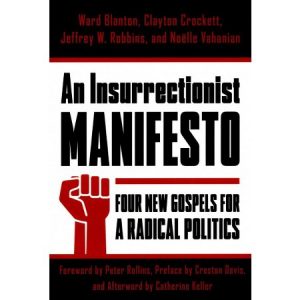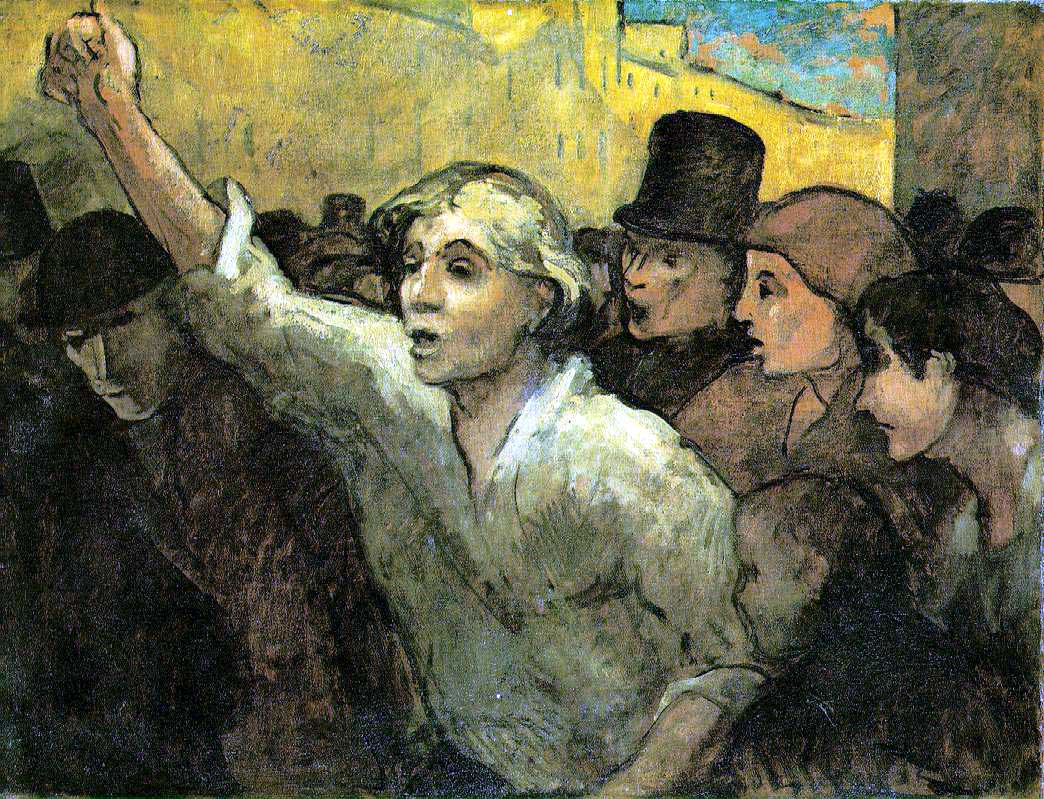Blanton, Ward. Crockett, Clayton. Robbins, Jeffrey. Vahanian, Noëlle. An Insurrectionist Manifesto: Four New Gospels for a Radical Politics (Insurrections: Critical Studies in Religion, Politics, and Culture). New York: Columbia University Press, 2016. ISBN: 0231176236. Hardcover, paperback, e-book.
We have entered a historical juncture at which it has become commonplace to offer advice to the left. The academy, where the left once thrived (some would say languished in elitism and obscurity), has become integrated into the economic and managerial fabric of neoliberalism, the humanities defunded, investments targeted for programs that stand to make obvious and measurable contributions to economic growth, and in some cases speech actively stifled.
A broader view would also include the impacts of postmodernism and the end of the Cold War. Postmodernism seemed to commodify dissent, undermine optimism about historical progress, promote pessimism about the possibility of mass movements, and extinguish any sense of truth or foundations that might have served in the past as leverage for normative political claims. The end of the Cold War, meanwhile, seemed to signal the triumph of global capitalism. It is not surprising, then, that there have been attempts to redefine politics at a time when orthodox models have little to show for and liberalism’s gains have become indistinguishable from their conservative counterparts.
A few years ago, in an example of the kind of political writing that has emerged in response to these conditions, Ash Amin and Nigel Thrift argued in Arts of the Political: New Openings for the Left that the left needed to refresh its strategies. They described an aging movement whose tactics were incoherent and ineffective and they outlined some ideas, some openings, for a new kind of politics. They portrayed a movement that had lost its bearings, asserting that the solution was to reaffirm the kind of futurity that the Left embraced in its prime but has since forfeited.
As they saw it, unnecessarily complex theories about things like agency, subjectivity, identity, everydayness, ordinariness, affect, presentness, and so forth misdirected our energies away from objective conditions and from strategies for dealing with them. Because such theories are largely navel-gazing and have failed to offer straightforward solutions, the book’s argument was that they created something like a public relations fiasco through their inability to inspire faith, particularly among younger generations, in the realistic prospect of reshaping the future.
The left, they said, has become incomprehensible and sedentary and is dying of old age. Amin and Thrift wanted to see a more agile movement capable of disclosing new futures by repopulating the political with “new visions, new desires, and new modes of organization,” without which a “different future cannot be seen or desired and the present is viscerally understood as closed.”[1]
A new book in theology, An Insurrectionist Manifesto: Four New Gospels for a Radical Politics (2016), is written in the same vein and shares something of the spirit of Arts of the Political, but with a couple of conspicuous differences. Amin and Thrift complained that the left’s ideas had become too obscure because of the complex contributions of contemporary theory, whereas Ward Blanton, Clayton Crockett, Creston Davis, Jeffrey W. Robbins, and Noelle Vahanian are calling for even greater, more complex reliance on theory.
Moreover, their volume describes itself not only as an attempt to forge a more radical path for politics, but for theology. Although I am not a theologian, I’d like to think about the contribution this book makes to the broader genre of politically interventionist writing. I have some reservations, both about this book and about the wider impulse to generate manifestos and similar projects whose language emphasizes a correctional attitude coupled with a desire to consolidate interest around a new concept or movement, but I would also like to try to identify traces of something within them that seem promising to me.
An Insurrectionist Manifesto wants to forge a path for theology that even more vigorously engages traditions of contemporary theory. This is both what is compelling about the book and what will assuredly deter some readers. A rough and dirty account of its core claims (bearing in mind that collaborative works like this are not always amenable to core claims) would certainly include its emphasis on the concept of the Real, the Lacanian notion of a kind of truth and transcendence that is on the one hand utterly constitutive of both subjectivity and (thanks especially to Zizek’s commentary) collectivity, but which is also nothing like traditional notions of truth and transcendence.
In the view of these authors, the Real also has the merit of pushing back against postmodern denunciations of truth and transcendence, which explains something about how and why this book situates itself at the margins of the various traditions of radical theology that identify with and openly embrace postmodern turns in philosophy, culture, and politics. Because so much of what is proclaimed by the book revolves around the more general suggestion that theory can inform a more radical theology, it is worth thinking at the start about the nature and implications of theory.
I once asked a graduate school professor to define it for me even I knew what it was, and she knew that. The question was more like, what does it want? What I understood already was that it’s the application of certain traditions and styles of philosophy to other disciplines in the humanities and social sciences. It was more politically engaged than traditional philosophy, it was trying to comprehend dramatic cultural changes and new cultural forms at the time, and it rejected longstanding propensities in traditional approaches having to do with ideas about truth, meaning, history, language, the human, and identity.
In the forms in which we know it today, I knew that it began roughly in the 1960s with the confluence of several events, two of which were the rise of the New Left (with the Soviet invasion of Hungary in 1956 as an important historical marker) and crises of self-understanding within a number of disciplines. These helped created the conditions in which “theory” (as shorthand for something a little broader than critical theory or cultural theory or even continental theory) could start to occupy an increasingly prominent place in the publishing, researching, and teaching institutions of the academy.
The professor to whom I posed the question (Theresa deLauretis, who specialized in feminist film theory and psychoanalysis) responded without blinking that for her, theory in a nutshell is the desire to think beyond. This explanation struck me then as fascinating and still does. So many of the terms and concepts that I encountered during and after graduate school can be seen as part of an effort to do this, terms like the transcendental and the quasi-transcendental, the Real, utopia, resistance, excess, lacks and gaps, the Other, the non-identical, alterity, the sublime, limit concepts, vanishing points, the undecidable, the unsayable, the unconscious.
Theory and its Critics
Theory has of course never been without its critics. It has a reputation for obscurity, which is to say that there are some stylistic (and jargonistic) tendencies toward the enigmatic and the abstruse. One culturally conservative journal, Philosophy and Literature, has been in the habit of offering bad writing awards to authors based on its own standards of unnecessary obscurity. One of its recipients, Judith Butler, observed in a written response that all of the winners of this prize have been writers on the left, leading her to pose the following question: “Why are some of the most trenchant social criticisms often expressed through difficult and demanding language?”
Her answer was that scholars trying to “question common sense, interrogate its tacit presumptions and provoke new ways of looking at a familiar world”[2] have often felt the need to do so in language that challenges how we think and talk about the world. Not all theory is quite so demanding—Stuart Hall, a leading figure in the Birmingham School of cultural studies, wrote about complicated subject matter in an invitingly clear way—but I have always taken Butler’s point to heart by practicing patience with demanding texts when I can see that they are attempting to unsettle the ways we’ve learned to think about stuff.
Butler’s response hints at some of the other recurring criticisms of theory, one of which is that it is too politically committed, which traditionalists see as a handicap to genuine knowledge production. There can be no doubt that theory is a form of political engagement. One of its arguments, however, is that the language of science, traditional philosophy, and classical approaches within the various disciplines are political as well, that they have failed to acknowledge that their perspectives, viewpoints, and methodologies harbor commitments whether they realize and intend it or not. Something that theory has tried to do, in other words, is to render the latently political implications of all forms of knowledge production visible so that they can be evaluated out in the open.
Another criticism has to do with what we might call eclecticism. One of the strategies that theory employs as it tries to examine the production of knowledge is interdisciplinarity, which brings multiple disciplines into conversation with one another and by doing so allows new kinds of questions and problems to emerge. This can be disconcerting for someone who is trained in the methods and concepts of a particular discipline and is suddenly asked to digest a foreign body of concepts. The results of eclecticism are mixed, but in many cases it has had the effect of opening up new vistas of understanding and practice that would have gone unnoticed had we remained isolated within the silos of disciplinary thinking.
Two additional criticisms raise a common concern. One is that, despite its claims to be radical, there is something elitist about its demanding style of theoretical writing and about the kind of specialization it creates for itself as it constructs new vocabularies that only the most dedicated reader can learn to decipher. This is an especially difficult criticism to rebut and in this case the critics might be onto something. Still, it is rarely the case in other fields of inquiry that scholarship that might have valid implications for the lives of ordinary people is measured against the standard that anyone on the street should be able to immediately comprehend it without investing a substantial amount of time and effort into the task.
To say that theory often takes the form of what at first seems like an undecipherable language does not warrant the claim that it is hypocritically elitist as it speaks on behalf of the oppressed or interrogates mechanisms of ideology. In this sense, theory is no different than any other science. The fact that its insights sometimes call for specialized language is by itself no refutation of its merits.
A related criticism of theory is sometimes issued internally from orthodox factions that see not just its obscurity but the substance of its claims and proposals as undermining the needs of progressive movements and as therefore regressive. The charge of political regression has been leveled against many theorists. This includes Butler, who has been criticized by fellow feminists for robbing feminism of its agentival subject (“woman”). Adorno was targeted by activist students in the 1960s who viewed him as an elitist who lacked sympathies with actual political movements and as someone whose ideas promoted political resignation because they were skeptical of the idea that philosophy should or could always produce blueprint-ready solutions to the problems it identified.
Scholars and activists associated with the black liberation struggle were accused by Marxists of detracting from the real, underlying class issue that they believed needed to be the focus of political thinking and activism. Deconstruction was charged with obscurity as well as inhibiting political practice since, like Butler’s theories (which are informed by deconstruction), it undermined concepts of truth and agency and might leave one feeling that there is nothing “constructive” to be done. Similar criticisms were leveled against Michel Foucault, Gilles Deleuze, and others. There is no shortage of examples of the claim that theory’s tendencies to accentuate complications, to “trouble” and “problematize” issues instead of boiling them down to tidy problems and straightforward solutions, are counterproductive to the tasks of political change and movements.
 The criticisms of theory are many and varied and they have been issued from conservatives and leftists alike, not to mention from politically disinterested traditionalists from disciplines that have been affected by the impacts of new ways of thinking about their subject matter. One of the assertions of An Insurrectionist Manifesto is that theology has still not done enough to engage theory in ways that would force it to question its own assumptions, even within traditions of the death of God and other radical political theologies.
The criticisms of theory are many and varied and they have been issued from conservatives and leftists alike, not to mention from politically disinterested traditionalists from disciplines that have been affected by the impacts of new ways of thinking about their subject matter. One of the assertions of An Insurrectionist Manifesto is that theology has still not done enough to engage theory in ways that would force it to question its own assumptions, even within traditions of the death of God and other radical political theologies.
It is predictable, then, that this volume will be received by some readers in ways that recapitulate the various criticisms that theory has endured in the last several decades, i.e., that it is too political, too obscure, elitist in its specialized language, and that in some respects and in spite of its own claims to the contrary, it contains potentially regressive elements. But if one feels inclined to dismiss this work for the same reasons that people have dismissed theory in the past, then one has in my view failed to adequately engage the volume’s desire to make what might prove valid and timely contributions to theology and political thought.
What Exactly Is A “Manifesto”?
As I approached this book, the first question I asked myself was in what sense it is a “manifesto.” The jointly authored introduction frames the project of an insurrectionist theology, which is something that manifestos are designed to do. One could also argue that manifestos serve the purpose of communicating in ways that make their principles and goals clear to as many readerships as possible, which I doubt has been accomplished in sentences about how “as odd archivists of the step back into insurrection, our sifting through the archive of religion for the emergence and maintenance of these regularized, affective, organ-ized zones necessarily brings with it a plague of fantasies for a chaotic ethology without ready-made artifice” (64). But there are two reasons I still think this volume is manifesto-like.
One is that the genre has evolved over time, especially with the dozens of manifestos of aesthetic modernism in the early- and mid-twentieth century, but again (and much closer to home in the case of Crockett’s essay on ecological science) in the 1980s with the publication of Donna Haraway’s “Cyborg Manifesto”—which I see as an important precursor to this project, if not also as a reason to read the book as inhabiting a kind of “retro” style (whether or not this was unwitting is hard to say). After all, the book’s cover graphic draws on an older Soviet agitation aesthetic.
More importantly, there is a kind of freneticism and rabid eclecticism at work that reminds me of the classic postmodern novels of the 1980s. The fact that one isn’t sure whether this is a serious manifesto or whether the whole thing was meant ironically is itself another reason to place it within that genre, which was known for its self-conscious irony and has been criticized for many of the same reasons as contemporary theory. This was due in part to the fact that those fiction authors (Delillo and so forth) had discovered people like Deleuze and Baudrillard, a point that was overlooked when David Foster Wallace attributed what they were doing to the influence of television.
The fact is, manifestos have not always been plainspoken. There is precedent for manifestos that attempt to break new ground by adapting the language and insights of complex theoretical discourse. The manifesto of Marx and Engels applied Hegel’s still relatively new and cerebral philosophy of history to an interpretation of the epic significance of the impending revolution. In doing so, Marx and Engels drew upon theoretical concepts that the proletariat itself would not necessarily have grasped in all their depth and nuance.
The fact that the authors of An Insurrectionist Manifesto seem to be experimenting with manifesto-style prose and rhetoric makes one wonder whether they might not have been playing with it. But of course, authors themselves aren’t always sure whether they’re serious or not, or to what extent. Sometimes the act of writing causes one to become more serious, to begin to believe more strongly in what began as the playful challenge of adopting a particular voice and style and seeing how well one can inhabit it.
In this case, the results of what might or might not have been an experimental act include a tendency toward neologism, alliteration, and hyphenation; heavy use of “we,” “our,” and “us”; repetition of the concept of insurrectionism in a way that seems interested in thrusting it into the intellectual memosphere and announcing the emergence, not of a book series but of a Movement; repeated self-description in terms of edginess and avant-gardism; denunciations of other approaches as insipid or insignificant; and evocations of an esoteric and sometimes epic nature. If one were to write a mock manifesto, these would no doubt be staple features of the exercise, which is why it’s difficult to know whether this project was entirely earnest or at least somewhat tongue in cheek.
I do think this text has appropriated the manifesto genre and I suspect that it has done so in earnest, but if one was looking for something for something to compare it to, then I think one would have to look at the accelerationist manifestos of the 1990s and 2000s. Accelerationists like Nick Land, who co-founded the Cybernetic Culture Research Unit at University of Warwick in 1995, have argued that the best response to capitalism is not to embrace its opposite in the form of various “slow culture” movements or even to attempt to bring it to halt with resistance movements, but to either passively watch or actively participate in the coming techno-capitalist meltdown.
Land and others responded affirmatively to the question originally posed by Deleuze and Guattari in Anti-Oedipus (who they cite often and regard as the grandfather of the movement): “Which is the revolutionary path? … To withdraw from the world market […]? Or might it go in the opposite direction? To go still further, that is, in the movement of the market, of decoding and deterritorialization? For perhaps the flows are not yet deterritorialized enough, not decoded enough … Not to withdraw from the process, but to go further, to accelerate the process.”[3] The idea, which they celebrate, is that technology and financial systems will eventually run ahead of themselves at such an unmanageable rate that the system generates insurgent forms of proto-post-capitalist life.
In their early days, accelerationists anticipated the advent of an eventual democratic hegemony that will have come about not because human agents escaped or overthrew anything but because they rode the turbo-technocapitalist bull to the very end. Elements of the original argument were present in Marx in the form of a kind of admiration for technology and a sense that it will on the one hand generate the problems that lead to its destruction, but that, on the other hand, capitalist development will only reach that point by accelerating the pace of its technological advances and thus, as well, the intensity of its internal contradictions (this explains why one occasionally finds Marx favoring, though not without irony, things like free trade).
But aside from Marx and some references to Nietzsche, it is the spirit of Deleuze that resonates throughout their writings the most, often in a way that results in a kind of cryptic, techno-poetic rhetoric. Here, for example, is Nick Land in what was probably the original accelerationist manifesto, “Meltdown”: “Beyond the Judgement of God. Meltdown: planetary china-syndrome, dissolution of the biosphere into the technosphere, terminal speculative bubble crisis, ultravirus, and revolution stripped of all christian-socialist eschatology (down to its burn-core of crashed security). It is poised to eat your TV, infect your bank account, and hack xenodata from your mitochondria.”[4]
The movement’s main thrust was its critique of the traditional left and of liberal progressivism. In a revised manifesto for accelerationism’s post-Nick Landian phase (Land has gone on to become associated with the neoreactionary and alt-right movements), Nick Srnicek and Alex Williams criticized today’s Left for missing the point by clinging to the “folk politics” of what’s slow, local, and corporeal: “The Euro-American Left’s current obsessions with localism, direct action, and deliberative democracy are ill-matched when confronted with the acephalous monstrosity that is global capital today. What is therefore necessary is the constitution of a Left comfortable with globality, complexity, mediation, quantification, and technology, rather than sentimentalized modes of action and organization.”[5]
Insurrectionism and Accelerationism
To be clear, I am not suggesting that the writers of An Insurrectionist Manifesto share the same politics as the accelerationists (partly because, unlike those of the accelerationists, the manifesto of the insurrectionists is not clear enough about their politics to make such a determination), but their reliance on Deleuze, occasionally the style of their prose, the centrality of their project’s opposition to other left-wing theologies and political movements, their targeting of the neoliberal academy (about which Nick Land wrote often and scathingly), and their choice to inhabit the language and traditions of the manifesto genre, past and present, situate this book within the climate of a recognizable style of “end of history” theorizing that we have seen numerous examples of during the last two or three decades with mixed results.
as the accelerationists (partly because, unlike those of the accelerationists, the manifesto of the insurrectionists is not clear enough about their politics to make such a determination), but their reliance on Deleuze, occasionally the style of their prose, the centrality of their project’s opposition to other left-wing theologies and political movements, their targeting of the neoliberal academy (about which Nick Land wrote often and scathingly), and their choice to inhabit the language and traditions of the manifesto genre, past and present, situate this book within the climate of a recognizable style of “end of history” theorizing that we have seen numerous examples of during the last two or three decades with mixed results.
As in cases like Amin and Thrift’s Arts of the Political and Camille de Toledo’s 2008 Coming of Age at the End of History (which is a stylistically closer example), these are works, usually by younger writers, that worry about the neutralization of left-wing resistance movements and that are looking for new labels and a new language with which to revive radical forms of dissent that do not simply occupy what have by now become well-anticipated spaces within the range of normative political discourse. The “insurgent” politics of An Insurrectionist Manifesto strike me as an attempt to initiate something similar in the arena of theology, using similar sources and rhetorical styles.
What, then, are the specific claims and aims of this new radical theology? At the most obvious level, it is simply to intensify the reliance of theology on “cutting edge” theory, particularly those that resist postmodernism by incorporating a concept of the Real. Zizek’s presence obviously looms large here, both as an often-quoted source and as a sort of ally or intellectual sponsor for the project, but the volume’s engagements with Heidegger and Deleuze are more thorough and pronounced. The four “gospels” are transposed onto Heidegger’s paganishly esoteric fourfold of earth, sky, divinities, and mortals (with caveats about his Black Forest cabin, peasantry-philia, Nazi collusion, etc.).
Blanton is interested, among other things, in how we might refresh or create a “clearing” for Heidegger’s philosophy for the digital age (his reference to “refreshing” being a play on words). Crockett enlists Deleuze’s concepts of repetition and the body without organs as analogues for his attempt to integrate spirit (the subject of theology) and matter (the subject of a politics of Earth, production, and the human) into the more fluid concept of energy. Zizek, Heidegger, and Deleuze (with the possible addition of Catherine Malabou’s new materialist theology) are at the heart of this book’s effort to bring theology into closer conversation with theory, but it does not end with these. Readers are presented with a cook’s tour of continental authors and traditions, in addition (especially in Crockett’s case) to literature from the natural and physical sciences and, in all four essays, other disciplines in the humanities and social sciences.
One would expect, of course, that a manifesto of this sort is doing more for theology and politics than simply appealing to and showcasing an edgier integration of theory and bemoaning those who don’t. Indeed it is, I think, calling upon theory to help it do some conceptual work in theology, even if the elucidation of that work lacks granular specificity. One feature of the manifesto genre aimed at assisting readers in this respect is the list of principles that one tends to find there.
The introduction to this volume contains such a list, but instead of positions and principles it speaks largely about a style or temperament that it seeks to adopt and establishes affiliations with other theorists and traditions—1: all the various radical theologies from Tillich to the present, 2: an ontology of the Real in Lacan, Deleuze, Zizek, and Laruelle, 3: theological materialism like what you find in Malabou, 4: a “leftist political edge,” and 5: an “experimental” theology in the spirit of Kristeva.
While these tenets or principles (if you can call them that) tell us how they would like to be perceived and which writers and intellectual trends they see themselves allied with, just what it is that they stand for or against remains a bit of an open question. In the preface and introduction, which serve to frame the volume, the way they handle this question (what do we want?) is muddled by criticisms that are either too sweeping to provide serious clues to an answer, or else too indiscriminate to offer a coherent sense of what they have in mind.
In the preface, for example, Davis suggests that what motivated them to write the book (and to create the series it is intended to introduce) was their feeling that “nothing was being said of any significance … in critical theory but also in continental philosophy, religion, and other subjects” (xi). Hyperbole is forgivable, especially when one is trying to inhabit the manifesto’s language of necessary, wholesale transformations, and indeed these writers would go on, in the introduction, to identify a host of authors in these very same fields of critical theory, continental philosophy, and religion whose significant contributions they admire and seek to build upon.
There is, however, a more pressing problem with beginning a book and a book series with statements like this, which is that it simply isn’t helpful since it doesn’t indicate with any kind of precision or clarity what a reader should be looking for that can be expected to rise above the worthlessness of everything else going on in intellectual circles today.
In the introduction and throughout the book, the authors do begin to compile an array of targets and these include capitalism, conservatism, liberalism, liberal theologies, the neoliberal academy, the traditional left, and postmodernism (among other things). Although they locate themselves at its margins, they seem above all to want to provide an alternative to radical death of God theologies, but the nature of the “radical politics” that are to emerge from forging another alternative theology is never quite spelled out.
In itself this would not be an issue, not only because each of the four “gospel” writers is given the
opportunity to develop his own, semi-autonomous conception of a radical politics, but also because there is no requirement that a radically insurgent politics needs to take the form of a clear agenda with definable targets and goals. Unless, I suppose, it’s presented in the form of a manifesto.
What the volume lacks in terms of a coherent critique it makes up for in its emphasis on the imagery of insurrections and insurgencies, which is rooted in Heidegger’s concept of surging up into the world. Surge metaphors have proven malleable in the past. Sartre borrowed it from Heidegger to describe that now old-fashioned project of existentialism (man “exists, encounters himself, surges up in the world,”  1946) and a slew of mid-century existentialist theologians embraced it in turn. It has served right- and left-wing intellectual movements alike with equal ease.
1946) and a slew of mid-century existentialist theologians embraced it in turn. It has served right- and left-wing intellectual movements alike with equal ease.
Crossing the Boundaries
The authors of An Insurrectionist Manifesto are capitalizing on the image’s ability to cross the boundaries of Heideggerianism, politically revolutionary rhetoric, and theology, contrasting the surge of their insurrection with resurrection-centric theologies that they suggest tend to concentrate on individual conversion and are thus too compatible with (I take them to mean) the kind of bourgeois, atomistic individualism that is formalized and institutionalized by capitalism.
Personally, I prefer cosmopolitan convivialities and intersectional solidarities over the communitarian language of soil-born groundswells, but I suspect that these authors are influenced by Alain Badiou’s Marx-inflected version of the surge as the emergence of the Event. Still, one of the volume’s shortcomings is a tendency to favor imagery and attitude over coherent articulations of what sort of radical politics are to be encapsulated by the term insurrectionism. Maybe it is unfair to expect the kind of naming of the System that Althusser used to talk about as necessary to radical politics, but it is hard not to look for something along those lines when the message has been sold in the package of a manifesto.
Although it is politically engaged, my own suggestion would be that it is best not to read this volume as a political manifesto, nor even, I would finally have to conclude, as a manifesto as such, but rather as an intervention into what is assuredly a debate having to do with political, or at least politicized, theology. It intervenes by taking a stand somewhere ambiguously within and beyond the death of God theologies of the 1960s, sympathetic to their desires to conceive theology without a God-entity but critical of the framework within which they cling to and embrace a conventional Enlightenment understanding of the secular.
On the other hand, the clearest, most consistent, and I think valuable idea to emerge across the various contributions to the volume is the idea of a theology that would be capable of equating, in one sense or another, theology’s subject matter with matter itself, a sort of new materialist spirituality that doesn’t reduce materiality to some pure substance or atomistic state but instead sees something quasi-transcendental within the kinds of matter- and energy-flows that are characteristic of the realities of the 21st century.
These are realities, as the authors are good about discussing, that have been revealed by discoveries in quantum physics (something Zizek has written at length about), by recent understandings of energy, by the digital age, by information-, image-, capital-, culture-, and people-flows in the era of globalization, by an appreciation of “embodiment” as networks and matrices of a global flesh rather than states of enclosure, and so on and so forth. When, for instance, Crockett calls for an energy-based concept of Earth and of materialism and when Blanton reinterprets transcendence in a materialist (and somewhat Gothic-dystopian) fashion, they seem to be calling not so much for a materialist theology but for a theology of new materialism. This particular specter might have started haunting theology some time ago, but I would rank it among the best contributions of the volume.
While this is a valuable contribution, it is not quite so cutting edge as they suggest. The authors are unquestionably interested in thinking about the politics of the present age, one that is materialist but non-reductive (and about how this translates for theology), but this is how most recent Marxist philosophies and left-wing discourses describe themselves today (non-reductive, against economic determinism, etc.). The new materialisms of the past couple of decades (including Malabou’s, but also those of Brian Massumi, Lauren Berlant, and Sarah Ahmed) have helped expand the possibilities for how we think about materialism, and yet even they would describe themselves as building on the work of previous traditions of materialism rather than situating themselves as representatives of a radical break.
Unquestionably, this book has given us opportunities to think about the relevance of new materialism to theology, but its packaging as a cutting edge manifesto for something that is both radical and radically new ends up getting in the way. One wonders whether there might not have been another genre more suitable to the context. I’m thinking, for instance, of the genres of “interventions,” “openings,” and of “notes” toward a new theology whose relationship to the political is explicit and explicitly radical. This might have invited the ethos of experimentation and collaboration that the fifth principle of the introduction/manifesto indicated was going to be one of its core concerns.
As a theological intervention, An Insurrectionist Manifesto has much to offer, but what it offers is perhaps too subtle to be accommodated by the usual bravado of the manifesto form. The authors in this book all seem to be walking (with admirable agility) a precarious line between wanting to take radical death of God theologies even further while at the same time rescuing something that those theologies abandoned. My novice reaction to the argument that we need a theology without God has always been to wonder why, in that case, we need theology in the first place.
One doesn’t have to be naive about the secular to conclude that theology is perhaps, at some point, simply irrelevant. And indeed, there are moments in the book when it would appear that in their attempt to forge a path for a radical new theology, what they have actually been doing is pondering the need for one at all. Crockett’s account of energy as spirit strikes me as highly intriguing, but after he completes his analysis of the hard science, one finds oneself wondering whether there is a need any longer to evoke theology in order to appreciate materiality in the non-reductive, more fluid and flow-centric way that he describes.
Theory As Blasphemy
This leads me to ask another question: If these authors stand at the “edge” of something, might it not be the precipice between theology and non-theology, and why are they so unwilling to go any further?
I’m not suggesting that they should jump. No doubt, given its fantastic elasticity, there is a way to salvage a theology of new materialism, but I suggest that the path for getting there would have been improved by lessons learned from Haraway’s manifesto (Theresa deLauretis’ long-time colleague and someone who Crockett mentions in passing). Haraway describes her manifesto as an effort to build “an ironic political myth faithful to feminism, socialism, and materialism,” not faithful as reverent worship but as “blasphemy.” She sees blasphemy as different than apostasy, which is too serious in its  denunciations.
denunciations.
Blasphemy, on the other hand, is an ironic myth that preserves the need for community while using irony to hold incompatible things together by attending to contradictions. I wonder whether it would have been possible for the authors of this volume to take a less epic tone toward their edgy insurrection by openly acknowledging that the political-theological myth they envision is an ironic one—that it upholds the theological desire to think and see beyond even as it calls into question the very concept of theology, possibly even the need for a theology at all. I would prefer to see a theology that is prepared to take its own theologicalness less earnestly, to embrace the irony (and blasphemy) of its effort to redefine the divine as matter once matter has turned out to be, as we learn in this book, as plastic and fluid and transcendental as any of the old gods.
When Crockett’s chapter on Earth re-describes matter as energy and energy as spirit, we are provided the following remark: we “are not the goal of evolution, but we are a kind of witness and we can therefore testify to the sublime beauty of this creation.” I’d like to conclude by reflecting on this phrase, testify to the sublime. Crockett had previously spent several pages delving into some dense but rather interesting scientific theories about the earth and thermodynamics, at the conclusion of which he quoted Zizek (although I doubt we needed Zizek to tell us this) saying that “humanity is not an exception to nature.” What I sense here is a desire to acknowledge that the fundamental materiality of our existence—which is to say, of earth’s and of our own—is not at all disparaging and that this insight is in fact enhanced by our understanding of materiality as a set of flows instead of atomistic states.
What I see this book as expressing is a desire for what the sublime also represents, a hankering to recapture the kind of beyondness that all those other radical theologies have apparently been ridding themselves of for several decades, but that theory, on the other hand and in a totally opposite way, has meanwhile accumulated a whole range of metaphors and terminologies and concepts for thinking about. Is it any wonder, then, that young theology and bible scholars are having trouble seeing anything inspiring in radical death of god theologies, but are finding what they’re looking for in the language of theory?
And that what they’re looking for would get expressed in sentences that talk about how we can testify to the sublime beauty of creation? Without needing to resort to flowery prose or any sort of squishy romanticism, I think some would admit that in the rush to deconstruct ourselves and the very foundations of our fields, there has been a tendency in religious studies, theology, and biblical studies to make one feel embarrassed to confess that sort of desire. Which means that if there is a “surge” taking place here, then it is at least in part a surge against this very thing, against the reduction of reality to its mere givenness. My own choice of words for this idea would not be God or spirit but utopia, but I recognize something similar in what has been expressed here.
It is interesting, in other words, that while radical theologies have been busy deconstructing every last trace of the beyond, the sublime has meanwhile been the subject of a good deal of attention and interest in contemporary theory. After the “social constructionism” of the 1980s when social realities were stripped down to threadbare states, the sublime began to emerge, for one thing, as a way of thinking about the overwhelming processes that are out of reach for us and too immense to grasp in their totality, but that also play such a determining role in every feature of our lives (multinational capitalism, digital cultures, etc.).
At the same time, the sublime also emerged as a way of talking about a desire to experience something enormous but located within the tiny interstices of daily life, something strangely internal to the very constitution of our sense of the present and of the material conditions and constitutions of our lives, but which was more than all that. An immanent excess, a remainder, an alterity. New materialist discourses in philosophy and cultural theory draw heavily on the language of the sublime and I’m not surprised that these authors are drawn to it as well.
Possibly with the exception of his reference to creation, which is a more theologically loaded term than I would have used, I find nothing overly romantic or sentimental about Crockett’s poeticization of an experience of the earth as sublime. There is a way of reading all those otherwise irksome references to “edginess”—which might now be understood differently as standing on the edge of a vanishing sense of beyondness (thanks to death of God theologies)―as ciphers of a similar sentiment.
But I think it would be mistaken to suggest that theory has brought a new understanding of matter to bear on theology’s desire to grasp the beyond. Is not rather the opposite? Is it not instead that theology has been brought into a relation to the beyond by having been guided to it by theory, which, as deLauretis put it, is the desire to think beyond? What theory has been showing us for some time now is that when you go all the way down into the depths of the material (matter, body, earth, production, labor, etc.), what you discover there is not some static ground or inert base but an opening, a horizon, a view of the world as containing within itself something that exceeds the manner in which we perceive it.
It isn’t that theology needs theory to complicate its grasp of the beyond, as if such a thing were the proprietary claim of theology. It is that theology, if it is anything at all, is another species of that desire to think beyond that we have, for the last few decades, been calling “theory.”
My final assessment of An Insurrectionist Manifesto is that the obstacles that it throws in the path toward appreciating its most basic desires and impulses do not entirely succeed in preventing them from getting through, that there is, for instance, something happening in this book that is conceptually superior to the argument of Amin and Thrift in Arts of the Political. Amin and Thrift shared a similar desire for a sense of the beyond, but could only envision it in a highly traditional way by identifying it with a sense of futurity, which is a staple of the kinds of temporal imagination that have defined the traditional left.
 Where, in this respect, the superiority of An Insurrectionist Manifesto is most evident to me is in a passage by Blanton, in which he contrasts the “vampiric transcendence” of insurrectionism with the twin tendencies of a “return” to the past and a “leap forward” to the future,” which he describes as inclinations that have historically masqueraded as the only viable routes to emancipation. Insurrectionism, he adds, is not “a breakthrough, a piercing of the collective or epochal veil,” or the “bearer of … newness.” What it is instead is a freedom to “cast about, even just to shuffle around, for instances of solidarities that these other stratagems, these other visions, tend to have missed.” It is not so much “coming, on the way, breaking through” as it is the “patiently inventive practice of archiving [which is to say] recategorizing, realigning, and differently accessing … in the search of solidarities we might enhance, encourage, develop” (95-96).
Where, in this respect, the superiority of An Insurrectionist Manifesto is most evident to me is in a passage by Blanton, in which he contrasts the “vampiric transcendence” of insurrectionism with the twin tendencies of a “return” to the past and a “leap forward” to the future,” which he describes as inclinations that have historically masqueraded as the only viable routes to emancipation. Insurrectionism, he adds, is not “a breakthrough, a piercing of the collective or epochal veil,” or the “bearer of … newness.” What it is instead is a freedom to “cast about, even just to shuffle around, for instances of solidarities that these other stratagems, these other visions, tend to have missed.” It is not so much “coming, on the way, breaking through” as it is the “patiently inventive practice of archiving [which is to say] recategorizing, realigning, and differently accessing … in the search of solidarities we might enhance, encourage, develop” (95-96).
This strikes me as something that is not a refusal of beyondness and transcendence, but also as avoiding the pitfalls of assuming that such things can only be found in the language of futurity or in that which is epic and edgy. I don’t know that it is a surge or an insurrection, but it is a useful set of analogies for the patient practice of forging solidarities and finding resources in the detritus of the damaged conditions of contemporary life for preserving a sense of, and of enhancing, encouraging, and developing, that which exceeds them.
Matthew Waggoner is an assistant professor of philosophy and religion at Albertus Magnus College in New Haven, Connecticut. He is the editor of The Standpoint of Redemption: Adorno and Religion, (University of Illinois Press, forthcoming) and co-editor of Readings in the Theory of Religion: Map, Text, Body (Routledge, 2016).
_______________________________________________________________________
[1] Ash Amin and Nigel Thrift, Arts of the Political: New Openings for the Left (Chappell Hill: Duke, 2013)
[2] Judith Butler, “A ‘Bad Writer’ Bites Back” in The New York Times Op-Ed, 20 March 1999, retrieved 23 February 2017 from https://pantherfile.uwm.edu/wash/www/butler.htm.
[3] Gilles Deleuze and Félix Guattari, Anti-Oedipus: Capitalism and Schizophrenia, London: Continuum, 2004, p. 260.
[4] Nick Land, “Meltdown” in Obstruct Culture: Swarm 1, http://www.ccru.net/swarm1/1_melt.htm, retrieved 1 April 2017.
[5] Nick Srnicek and Alex Williams, “#Accelerate: Manifesto for an Accelerationist Politics,” reprinted in #Accelerate: The Accelerationist Reader, eds. Robin Mackay and Armen Avanessian, Falmouth UK: Urbanomic Media Ltd., 2014.




